Visa event showcases fintech partnerships
 |
Digital payments have been steadily rising, with the shift to online payments predominantly seen among emerging consumer groups. Online marketplaces and payment portals for various services and utilities have become preferred channels for consumers comfortable using these secure means of shopping and paying for purchases.
According to Visa’s Consumer Payment Attitudes Study 2022, over 70 per cent of Vietnamese consumers are generally receptive to Open Banking, especially fintech and non-bank service providers that can open an account for them using their existing data.
The ever-growing fintech space, however, presents growth not only for business-to-consumer (B2C) companies. Business-to-business (B2B) enterprises across various industries can similarly leverage fintech to tap new markets for rewarding opportunities. Traditionally, commercial card-based payments have been used to support travel and entertainment-related business’s expenses. However, an increasing number of industry verticals are now using digital B2B payment solutions in response to challenges with supply chain payments.
“There are a lot of recognised pain points in the supply chain setup of old,” said Gareth Jon Parrington, senior director cum head of New Flows at Visa Asia Pacific. “Whether from the manufacturer to distributor phase, to the distributor to retailer phase, issues abound. Digitizing payment collections, however, provides a range of benefits, from improving data management and enhancing visibility for business analytics, to eliminating risk of cash and cheque handling.”
Fintech has also responded to the challenges brought on by cross-border payments. With the emergence of B2B e-marketplaces, which need to ensure a fast and smooth payout to sellers on their platforms, solutions such as virtual cards allow for the elimination of cross-border wire transfer complexities and enable improved data transparency and reconciliation.
 |
“With global money movements becoming increasingly widespread, Visa is focused on making B2B payments effortless for enterprises and removing the challenges and inefficiencies they face with old payment models. There is a tremendous opportunity for mutual growth, which is why we are supporting our B2B customers by maximising our fintech expertise,” said Parrington.
In Vietnam, B2B-focused fintech presents new revenue and growth streams for enterprises of all sizes. A recent McKinsey study noted that business disruptions caused by the pandemic have pushed companies to accelerate their digital journeys. This has fuelled B2B eCommerce, and the trend is here to stay as B2B buyers are increasingly comfortable with digital channels.
“The B2B e-marketplace is booming, and it’s the perfect time for Vietnam’s SMEs to take part in this continued growth,” said Dung Dang, Visa country manager for Vietnam and Laos. “We are seeing an increase in the use of B2B marketplaces, and in Vietnam, the agriculture, B2B travel, and fast-moving consumer goods sectors are likely to benefit greatly from enhanced supply chain access, ease of payment options, and high revenue growth potential.”
B2B relationships are vastly different from B2C, as buyers and suppliers often have long-term relationships. Interoperability is key to closing the gaps, allowing consumers and merchants from different markets and payment schemes to do business seamlessly around the world.
Visa B2B Connect provides predictable, efficient cross-border payments for businesses to transact internationally. It allows for more cost-effective cross-border transactions and provides both corporate finance institutions and their customers a transparent view of fees associated with each transaction, helping companies to manage their cash flows and streamline settlement.
“Visa has an expansive range of B2B solutions which can ensure that SMEs in Vietnam can tap new markets for both distribution and supply, and reliably conduct their online transactions,” added Dung. “This is not only reimagining B2B cross-border connections but ensures Vietnamese SMEs can remain competitive in today’s ever-growing business landscape.”
Dung also stressed that financial institutions should be able to capitalise on this opportunity also by supporting issuance for trusted partners. “Issuers should then leverage marketplace partnerships as acquisition channels. Through co-branded cards, they can support improved B2B payment capabilities while also expanding their customer base," she added.
 | Visa adds Google Wallet capabilities in Vietnam Visa, the world’s leader in digital payments, is launching Google Wallet for cardholders in Vietnam in partnership with ACB, Sacombank, Shinhan Bank, Techcombank, TPBank, Vietcombank, and VPBank. With the launch, Android and Wear OS users will be able to enjoy secure and convenient digital payments with a single tap of their smart device. |
 | Visa invites Asia-Pacific’s top startups to shape payment future Visa has announced an open call for startups across Asia-Pacific to apply for the Visa Accelerator Program 2023. |
 | Students benefit from Visa’s financial literacy initiative A financial literacy programme organised by Visa has provided essential financial education to nearly 8,000 students in Hanoi and Ho Chi Minh City through online and offline training sessions, teaching basic financial knowledge and money management skills. |
What the stars mean:
★ Poor ★ ★ Promising ★★★ Good ★★★★ Very good ★★★★★ Exceptional
Related Contents
Latest News
More News
- VIB named Best Customer Satisfaction Bank in Vietnam 2025 (December 26, 2025 | 16:40)
- Visa and Techcombank win AmCham’s 2025 ESG Tech Innovation Award for Eco Card (December 09, 2025 | 12:16)
- Visa brings tap-to-ride payments to Hanoi Metro Line 2A (December 05, 2025 | 17:35)
- Cross-border QR payments launched for Chinese tourists (December 03, 2025 | 19:12)
- VIB honoured by JP Morgan with 2025 US Dollar Clearing Elite Quality Recognition Award (December 02, 2025 | 17:04)
- Home Credit Vietnam brings financial literacy closer to women and students (November 20, 2025 | 11:25)
- MB partners with Visa, KOTRA to launch new MB Visa Hi BIZ card (November 20, 2025 | 11:24)
- VPBank upgrades core banking with Temenos and Systems Limited (November 14, 2025 | 17:54)
- CPO Home Credit shares how to build an AI-driven but human-centric workplace (October 30, 2025 | 09:56)
- VIB hits $267.4 million in pre-tax profit over first nine months (October 29, 2025 | 12:12)

 Tag:
Tag:


















 Mobile Version
Mobile Version